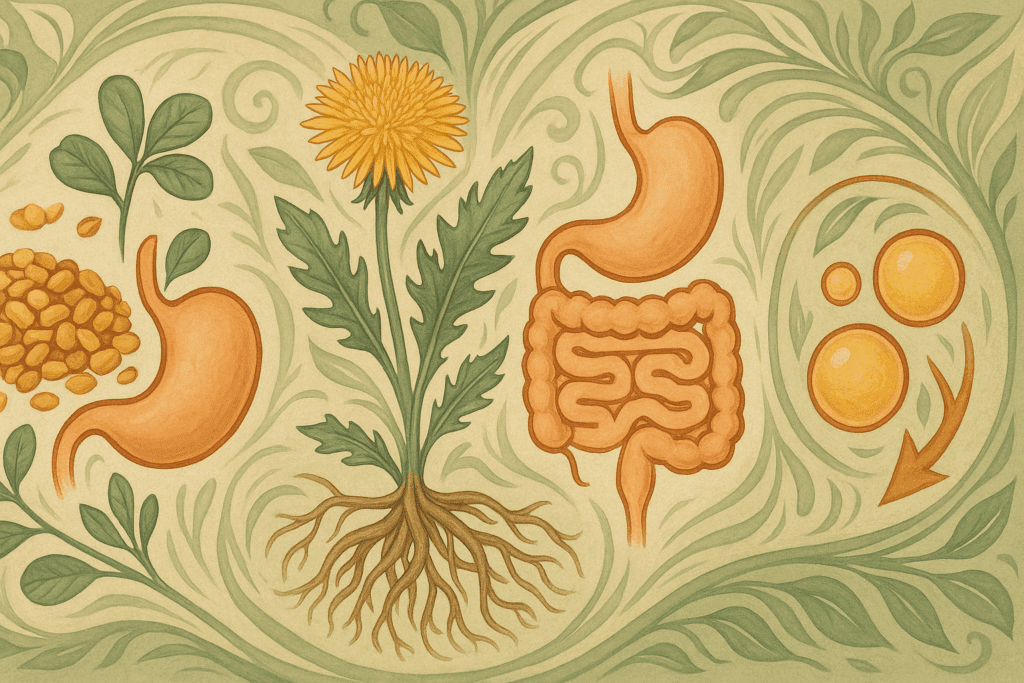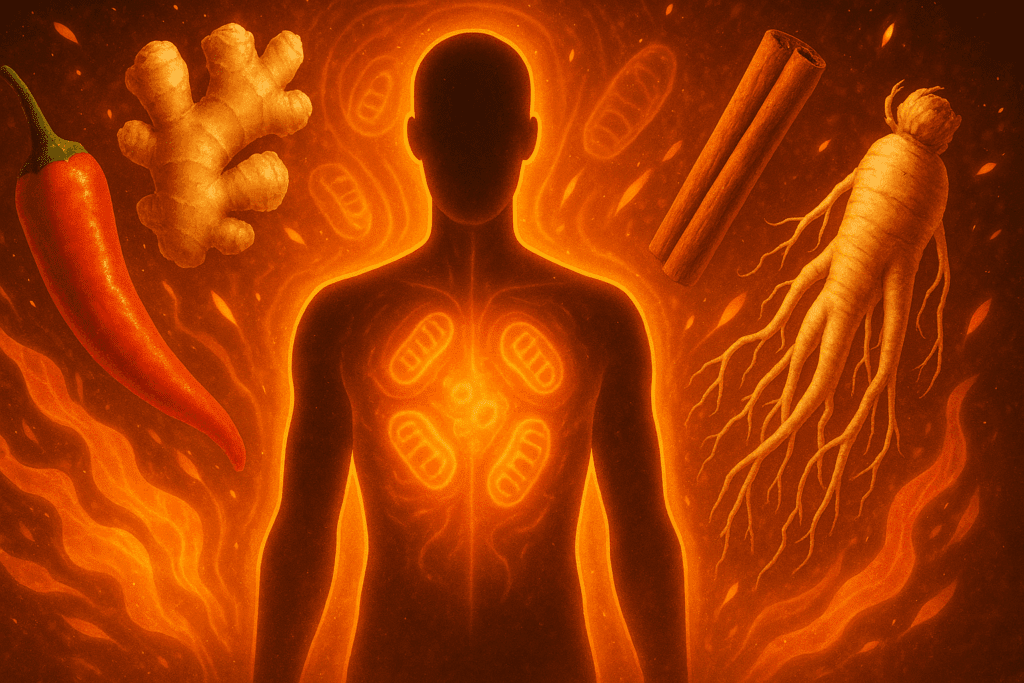Introduction: Unlocking the Power of Herbal Wisdom for Modern Weight Management
In a world where dietary trends come and go with bewildering speed, the timeless wisdom of herbal remedies remains a beacon for those seeking lasting, natural solutions. The quest for proven herbal remedies for fat absorption and sustainable weight management has never been more relevant. Modern science increasingly validates what ancient traditions have long known: nature provides potent allies for supporting healthy body composition. This article explores the emerging synergy between historical herbal use and current scientific inquiry, focusing particularly on how natural herbs for weight loss and spices for fat loss can offer a credible, holistic complement to today’s wellness strategies.
You may also like: Where to Buy Bacopa Monnieri: How to Find Quality Supplements for Cognitive and Memory Support
While multivitamins have become central to conversations about cognitive function, as evidenced by robust multivitamin efficacy and multivitamin memory study findings, similar research rigor is now being directed toward botanical interventions for weight health. As we dive into this discussion, we’ll uncover how specific herbs for weight loss influence not only fat metabolism but also appetite control, digestion, and hormonal balance. Just as multivitamins may slow memory loss and offer tangible benefits for brain function, natural weight loss remedies stand poised to support healthier metabolisms without the harsh side effects often associated with synthetic diet aids.

Understanding Fat Absorption and the Role of Herbal Interventions
Before delving into specific herbs that help with weight loss, it’s crucial to understand the physiological processes behind fat absorption. When we consume dietary fats, enzymes and bile acids break them down into fatty acids and monoglycerides for absorption through the intestinal wall. While fat is essential for health, excessive absorption can contribute to weight gain. Proven herbal remedies for fat absorption work by either inhibiting digestive enzymes like lipase or modulating bile acid activity, thereby reducing the amount of fat absorbed.
This mechanism parallels how multivitamin and memory loss studies highlight the nuanced roles specific micronutrients play in brain cell maintenance. Similarly, natural herbs to lose weight, by targeting specific digestive enzymes, allow the body to optimize nutrient intake without tipping into over-absorption. For example, studies exploring the benefits of mulberry leaf extract demonstrate its ability to inhibit lipase, supporting fat metabolism regulation in much the same way multivitamin research shows selective nutrient targeting benefits cognitive clarity.
Best Herbs for Weight Loss: Scientific Validation and Traditional Wisdom
Several weight reducing herbs have gained recognition in both traditional medicine and contemporary research. Garcinia cambogia, rich in hydroxycitric acid (HCA), is among the best herbs for weight loss due to its dual action of inhibiting fat production and suppressing appetite. Another notable contender is green tea extract, whose catechins stimulate thermogenesis and fat oxidation, functioning much like spices for fat loss such as cayenne pepper.
Moreover, herbs that suppress hunger, such as glucomannan derived from the konjac root, expand in the stomach to promote a feeling of fullness, naturally decreasing caloric intake. This physiological effect mirrors how certain multivitamin dementia study participants benefited from improved nutrient bioavailability, which indirectly supported cognitive performance. Just as a daily vitamin for memory loss can bolster brain resilience, consistent use of natural herbs for weight loss enhances satiety and promotes sustainable energy use, reinforcing long-term metabolic balance.

Natural Weight Loss Remedies: Integrating Herbal and Nutritional Strategies
The intersection between proven herbal remedies for fat absorption and comprehensive nutrition cannot be overstated. Integrative approaches that combine herbs for fat loss with nutrient-rich diets optimize results by leveraging the full spectrum of physiological pathways involved in weight management. For instance, turmeric, often highlighted among spices for weight loss, exhibits anti-inflammatory properties that not only aid metabolism but also support overall cellular health, much like findings from the multivitamin and memory loss study emphasize for brain vitality.
By weaving herbs to lose weight with a foundation of natural weight loss foods and herbs like leafy greens, berries, and legumes, individuals create a metabolic environment that mirrors the holistic philosophy underpinning the most successful multivitamin research initiatives. In this context, “natural” means more than organic or unprocessed; it refers to the synergistic, adaptive support these interventions offer to the body’s intrinsic regulatory systems.
Fat Burning Herbs and Spices: A Closer Look at Thermogenesis and Metabolic Boosting
When exploring fat burning herbs, the concept of thermogenesis—the production of heat within the body—emerges as a central theme. Spices for fat loss such as cayenne pepper, ginger, and cinnamon are known to activate thermogenic pathways, increasing caloric expenditure even at rest. This effect not only supports weight reduction but also enhances lipid metabolism, providing a natural parallel to the way multivitamin efficacy can optimize brain metabolism for improved cognitive outcomes.
Herbs to boost metabolism such as ginseng and bitter orange exert complementary effects by enhancing mitochondrial efficiency, thereby increasing energy production and expenditure. This thermogenic and metabolic support draws a fascinating comparison to the multivitamin memory study revelations, where nutrient combinations improved mitochondrial health in brain cells. Understanding these metabolic nuances allows for a more informed and strategic use of herbs for extreme weight loss in individuals seeking faster yet sustainable results.

Natural Herbs to Lose Weight: Targeting Appetite, Absorption, and Adipogenesis
Different natural herbs to lose weight address distinct aspects of the weight management puzzle. For instance, fenugreek seeds slow carbohydrate absorption while promoting satiety, whereas dandelion root supports digestive health and mild diuresis. These actions, collectively, mirror the nuanced interplay of multivitamin news findings, where combinations of vitamins yielded broader cognitive benefits than isolated nutrients alone.
What natural supplements help you lose weight most effectively often depends on the underlying cause of weight gain, whether it be poor digestion, hormonal imbalance, or chronic inflammation. Herbs that help you lose weight, therefore, must be chosen strategically, considering the individual’s metabolic profile and lifestyle. Just as the new study on vitamin supplements advocates for personalized supplementation approaches, tailoring the use of herbs for losing weight enhances efficacy and safety.
Spices for Weight Loss: Beyond Flavor to Functional Health Benefits
Spices are far more than culinary delights; they are functional allies in weight health. Research into what spices are good for weight loss and what spices help lose belly fat consistently highlights the benefits of black pepper (piperine), turmeric (curcumin), and cinnamon (cinnamaldehyde). These compounds not only stimulate thermogenesis but also enhance insulin sensitivity and modulate lipid metabolism.
In much the same way that multivitamins for brain function target cognitive pathways, spices for weight loss target metabolic and hormonal pathways essential for fat regulation. Their multifaceted actions provide compelling evidence that culinary practices can and should be considered part of natural weight loss remedies. By consciously incorporating spices into daily meals, individuals align themselves with centuries-old traditions validated by modern science.

Herbs That Suppress Hunger: Psychological and Physiological Implications
Appetite regulation is a cornerstone of sustainable weight management. Herbs that suppress hunger such as hoodia gordonii, caralluma fimbriata, and yerba mate offer natural alternatives to pharmacological appetite suppressants, reducing the risk of adverse effects. These botanical allies act through mechanisms such as influencing the hypothalamic hunger centers, slowing gastric emptying, or modulating hunger hormones like ghrelin and leptin.
The parallels with multivitamin research are striking. Just as multivitamin dementia study participants showed enhanced cognitive regulation of appetite and satiety signals, herbs good for weight loss offer similar neuroregulatory benefits. By improving the body’s ability to interpret true hunger cues versus emotional eating triggers, these plants support not just physiological but also psychological resilience, an often overlooked component of effective weight management.
Is Spice Good for Burning Fat? A Scientific Perspective
The question “is spice good for burning fat” deserves a nuanced, evidence-based answer. Emerging research confirms that spices such as chili, turmeric, ginger, and black pepper can indeed enhance fat burning by activating brown adipose tissue, increasing energy expenditure, and improving lipid mobilization. This dynamic thermogenic effect supports their classification among fat burning herbs.
Understanding how spices interact with metabolic pathways offers important insights for crafting effective natural weight loss foods and herbs strategies. Just as vitamin supplement study findings reveal how combinations of nutrients enhance cognitive outcomes, combining multiple spices in culinary or supplemental forms may yield synergistic benefits for fat metabolism. This holistic approach resonates with the overarching principles of multivitamin research, where complexity, not simplicity, often unlocks the most profound health outcomes.
What Is the Strongest Herb for Weight Loss? Evidence and Controversies
Identifying what is the strongest herb for weight loss is challenging due to individual variability and differing definitions of “strength.” However, candidates like Garcinia cambogia, green coffee bean extract, and forskolin consistently top the list based on clinical efficacy and user outcomes. These herbs influence fat metabolism, appetite suppression, and thermogenesis, offering multifaceted support for weight health.
Just as the strongest multivitamin for brain function is context-dependent, varying based on factors like age, sex, and cognitive baseline, so too must herbs for extreme weight loss be selected thoughtfully. The key lies not in finding a “magic bullet,” but in harmonizing botanical support with broader lifestyle strategies, including nutrient-rich diets and regular physical activity. This philosophy mirrors the approach endorsed by multivitamin and memory loss study researchers, emphasizing integrated, sustainable interventions.
What Natural Herbs Help With Weight Loss: Emerging Innovations
The landscape of natural herbs for weight loss is continually evolving as new research sheds light on lesser-known botanicals. Moringa oleifera, holy basil (tulsi), and berberine-rich herbs such as goldenseal are gaining recognition for their metabolism-supporting and appetite-regulating properties. These discoveries echo the evolving narrative in multivitamin news, where ongoing research uncovers additional cognitive benefits of nutrients once considered peripheral.
What natural herbs help with weight loss ultimately depends on an individual’s unique biology, lifestyle, and goals. Nonetheless, integrating scientifically validated herbs that help with weight loss into a broader wellness plan offers a credible, sustainable path forward. With obesity rates rising globally, the need for accessible, safe, and effective interventions has never been greater, and natural herbs stand ready to meet this challenge.

FAQ: Fresh Insights on Nuts for Cognitive Health and Brain Function
1. How do nuts influence brain energy levels throughout the day?
Nuts good for brain health play a crucial role in sustaining steady energy for cognitive tasks. Unlike high-glycemic snacks that spike and crash blood sugar, nuts deliver a slow, consistent release of nutrients that the brain can rely on throughout the day. The best nuts for brain health, such as walnuts and almonds, provide healthy fats and micronutrients that enhance mitochondrial efficiency within neurons, optimizing energy metabolism. Interestingly, studies suggest that magnesium in nuts directly supports ATP production—the fundamental energy molecule for brain activity. This means that a small portion of nuts as a mid-morning or afternoon snack may help maintain alertness, focus, and resilience against mental fatigue.
2. Are there specific combinations of nuts that enhance their brain benefits?
While single types of nuts good for brain health are beneficial, combining certain nuts can amplify their cognitive effects. For example, pairing pistachios, rich in carotenoids like lutein, with almonds, loaded with vitamin E, offers a broader antioxidant shield against neurodegenerative stress. The best nuts for brain health when combined, such as walnuts and Brazil nuts, supply complementary omega-3 fatty acids and selenium, promoting both anti-inflammatory responses and optimal neurotransmitter function. Emerging research in nutritional synergy supports the idea that diverse nut consumption may enhance overall brain performance more effectively than relying on one variety alone. Thus, a mixed handful can be a strategic tool for comprehensive cognitive protection.
3. Can nuts affect emotional resilience and mental well-being?
Absolutely—nuts good for brain function are increasingly recognized for their potential to influence mood stability. Nutrients like magnesium, zinc, and B vitamins found abundantly in many of the best nuts for brain health are essential cofactors in the production of serotonin, dopamine, and other neurotransmitters tied to emotional regulation. For individuals experiencing high stress or anxiety, regular intake of walnuts or cashews can contribute to calmer, more balanced moods over time. Moreover, omega-3 fatty acids present in some nuts are linked to reduced incidence of depression in clinical studies. While not a standalone therapy, strategic nut consumption can be a supportive pillar for emotional wellness.
4. How do nuts compare to other brain-boosting foods?
When considering foods good for cognitive performance, nuts consistently stand out due to their nutrient density and versatility. Compared to berries, another brain-boosting favorite, nuts good for brain function offer more sustainable energy from healthy fats and a broader range of fat-soluble antioxidants. The best nuts for brain health also excel in delivering crucial minerals like magnesium and copper, which are less abundant in many fruits and vegetables. Additionally, nuts provide structural lipids critical for maintaining neuronal membrane integrity, something leafy greens and most fruits lack. Integrating a range of brain-boosting foods together, however, remains the most effective strategy for comprehensive cognitive support.
5. What role do nuts play in brain aging and cognitive preservation?
Nuts good for brain health offer profound advantages when it comes to aging gracefully. Oxidative stress and chronic inflammation are major contributors to cognitive decline, and the antioxidants and polyphenols found in the best nuts for brain health counteract these processes at a cellular level. Studies indicate that consistent nut consumption correlates with better memory retention, processing speed, and executive function in older adults. Furthermore, the healthy fats in nuts help maintain vascular elasticity, supporting better blood flow to the brain as we age. By making nuts a daily habit, individuals can build a strong nutritional defense against age-related cognitive challenges.
6. Can nuts be part of a brain recovery diet after injury or illness?
Yes, integrating nuts good for brain recovery can offer critical nutritional support during periods of healing. The best nuts for brain health—particularly those high in vitamin E and omega-3s—can assist in repairing damaged neuronal membranes and mitigating oxidative stress following injuries like concussions or strokes. Cashews, for example, provide magnesium that facilitates synaptic plasticity, a key process in brain rewiring after trauma. Additionally, almonds’ antioxidant profile helps neutralize inflammatory free radicals, which tend to surge after brain injury. While nuts alone aren’t sufficient to replace medical treatment, they are a valuable part of a holistic brain recovery plan under clinical supervision.
7. How soon can someone expect to see cognitive benefits after adding nuts to their diet?
The timeline for experiencing cognitive improvements from consuming nuts good for brain function can vary widely depending on individual health status, diet quality, and consistency. Some studies suggest that biomarkers of reduced oxidative stress and improved endothelial function appear within just four to six weeks of daily nut intake. The best nuts for brain health, like walnuts and pistachios, may also enhance working memory and processing speed over longer periods, such as three to six months. However, benefits compound over time, meaning that the longer nuts are part of a regular diet, the greater their protective effect on cognitive vitality.
8. Are there any risks associated with eating too many nuts for brain health?
While nuts good for brain health are highly nutritious, moderation remains important. Overconsumption can lead to excessive calorie intake, which, over time, could contribute to unwanted weight gain—a risk factor for cognitive decline in itself. Additionally, some nuts are high in oxalates, compounds that, in large amounts, can contribute to kidney stone formation in susceptible individuals. To maximize the benefits of the best nuts for brain health without unintended side effects, it is wise to stick to recommended serving sizes (typically about one ounce per day) and to choose raw or dry-roasted varieties without added sugars or salts.
9. How do nuts influence brain-derived neurotrophic factor (BDNF) levels?
Brain-derived neurotrophic factor (BDNF) is essential for neuroplasticity, memory formation, and cognitive resilience, and nuts good for brain function may positively impact its expression. The best nuts for brain health, such as walnuts and hazelnuts, contain polyphenols and healthy fats that have been shown to upregulate BDNF signaling pathways in animal studies and preliminary human trials. Boosting BDNF levels is particularly important for protecting the brain against degenerative conditions like Alzheimer’s disease. Including a consistent intake of diverse nuts can be a strategic, natural way to encourage higher BDNF activity, thereby promoting better learning, memory, and adaptability over a lifetime.
10. Are there innovative ways to incorporate more brain-healthy nuts into a busy lifestyle?
Incorporating nuts good for brain vitality doesn’t have to be complicated or time-consuming. Some creative strategies include blending soaked almonds or walnuts into smoothies, adding pistachios to oatmeal or yogurt bowls, or using cashew butter as a spread for whole-grain toast. For savory dishes, sprinkling crushed nuts over salads, roasted vegetables, or even soups provides a delightful texture and a cognitive nutrition boost. The best nuts for brain health can also be ground into flours or crusts for cooking healthier desserts or snacks. With just a little planning, it’s easy to make these nutrient powerhouses a seamless part of even the busiest lifestyle.

Conclusion: Embracing Proven Herbal Remedies for Holistic Fat Loss and Vitality
As we reflect on the journey through proven herbal remedies for fat absorption and natural weight loss support, a clear theme emerges: complexity matters. No single herb, spice, or nutrient provides a panacea, just as no single multivitamin can address all dimensions of cognitive decline. Success lies in strategic, integrative approaches that leverage the full spectrum of nature’s offerings, from herbs good for weight loss to spices for fat loss to natural weight loss remedies that harmonize body, mind, and spirit.
Incorporating natural herbs to lose weight, whether through culinary practices, herbal teas, or targeted supplementation, empowers individuals to take proactive control of their metabolic destiny. Much like the insights from multivitamin efficacy and multivitamin memory study findings, the emerging science of herbal support underscores the power of preventive, lifestyle-based health strategies. By embracing this wisdom, we unlock not just the potential for healthier body composition, but also for greater vitality, cognitive resilience, and overall life satisfaction.
The future of weight management and metabolic health lies not in harsh synthetics or fleeting fads, but in the enduring alliance between tradition and evidence-based innovation. In this synthesis, we find hope, efficacy, and a path forward grounded in the best that nature and science have to offer.
Was this article helpful? Don’t let it stop with you. Share it right now with someone who needs to see it—whether it’s a friend, a colleague, or your whole network. And if staying ahead on this topic matters to you, subscribe to this publication for the most up-to-date information. You’ll get the latest insights delivered straight to you—no searching, no missing out.
Further Reading:
Dietary Supplements for Weight Loss
15 Herbs That Can Help You Lose Weight
.Important Note: The information contained in this article is for general informational purposes only, and should not be construed as health or medical advice, nor is it intended to diagnose, prevent, treat, or cure any disease or health condition. Before embarking on any diet, fitness regimen, or program of nutritional supplementation, it is advisable to consult your healthcare professional in order to determine its safety and probable efficacy in terms of your individual state of health.
Regarding Nutritional Supplements Or Other Non-Prescription Health Products: If any nutritional supplements or other non-prescription health products are mentioned in the foregoing article, any claims or statements made about them have not been evaluated by the U.S. Food and Drug Administration, and such nutritional supplements or other health products are not intended to diagnose, treat, cure, or prevent any disease.


